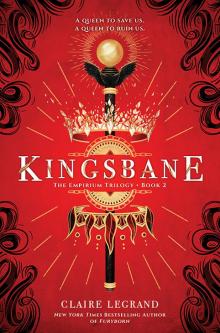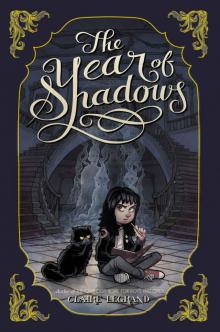- Home
- Claire Legrand
Foxheart Page 2
Foxheart Read online
Page 2
Girl slipped between the window bars and dropped to the floor. When her bare feet touched the cold stone, her heart kicking inside her chest, she allowed herself a moment to catch her breath and let her eyes adjust to the darkness.
Then, spotting Adele’s sleeping face, Girl grinned.
Pulling tricks on Adele, Girl suspected, would never lose its appeal, and the one she had planned for tonight was perhaps her best trick yet.
She hurried to the door and let Fox inside. He padded off into the darkness, the sack around his shoulders rustling.
Girl set to work.
First the patchwork cloak and gown, sewn together from scraps of cloth that Girl had stolen from Sister Veronika’s mending bag over several long weeks. She slipped the gown and cloak over her own head, and then donned the hat, a lopsided, pointed affair made from the same materials. Then the false hooked nose—clay, baked on the hot roof at midday. She had already painted clusters of warts onto her hands using ointments stolen from the sisters’ stores—would they ever manage to find a lock that could stump her?
Her hair, of course, required no alteration. It was strange and witchy on its own.
She adjusted her hat and looked around for Fox, excitement zipping through her body. If she was caught dressed like this, she would be confined to her room forever.
But she wouldn’t be caught. She never was, these days.
And when she did get back to her bed without being caught, she would really have to sit down, look over her list, and decide on a proper thieving name for herself. If she was to be the best thief in all the Star Lands, she couldn’t call herself Girl, and she certainly couldn’t use her real name.
Perhaps the Rogue of Lalunet, or the Silent Shifter, or Constance Craft, as a sly nod to Sister Veronika, who had tried to call Girl Constance for a six-month stretch when Girl was seven. Or perhaps—
Fox whuffed softly, and Girl shook herself. There would be time for choosing a name later.
She pocketed the coins on Adele’s bedside table, which was the real point of this excursion.
“Ready?” Girl whispered.
Fox trotted back toward the door, the small cloth sack she had tied around his shoulders now slack and empty. He let out another small whuff of air.
Girl squinted in the dim light, saw the shiny black beetles scuttling across Adele’s bedcovers where Fox had dumped them out—a trick that had taken weeks to teach him. She smiled and approached the bed, her shoulders hunched, her fingers bared like claws. She was ready to pounce, a wild cackle building in her throat—when Fox started growling at the door.
Girl froze.
“What?” she whispered.
The hair on Fox’s back stood up in a bristly line. Girl heard the creak of the main gate downstairs as it opened and shut.
No one ever came to the convent at this hour.
Girl crept to the window, stood on her toes, and peered out. A cloaked figure swept through the courtyard, Mother Petra herself hurrying alongside it. Shapes Girl couldn’t quite make out swirled above the cloaked figure’s shoulders.
Shadows?
With another low growl, Fox darted into the hallway.
“Fox!”
Adele shifted in her sleep, smacked her lips. A beetle plopped to the floor.
Girl hesitated. She didn’t want to miss Adele waking up to discover herself covered in beetles with a “witch” hovering over her—but Fox had never behaved like this before.
Girl hurried after him, down the hallway lined with the somber portraits of dead sisters, down the stairs, past the kitchen, and across the small stone yard to the classrooms.
Fox stood at the end of the hallway, a few paces away from Mother Petra’s office. The door was ajar, letting out lamplight. Girl slipped behind the loose wall panel and crawled into her eavesdropping spot, Fox at her heels. After she’d pulled the panel shut behind them, she crouched and, through a small brass grate, peered into the office. She saw Mother Petra, her desk, and the cloaked figure.
“This is most unusual,” Mother Petra was saying. “If Lord Aapo wishes to bring my students to see the capital, then I’m certain he would not send a messenger, if that is indeed who you are, to retrieve them in the middle of the night. Now, come. Tell me your full name.” Mother Petra arranged pen and paper. “You can find a room in town, and I’ll send a letter to Lord Aapo first thing in the morning, and we will get this sorted out. Until then, I’m afraid I will have to ask you to leave.”
A low murmur of words then, but Girl could not quite hear. Fox started growling once more. Girl pressed a finger to her lips, and Fox obediently fell silent.
“I beg your pardon?” said Mother Petra, in a shocked voice.
“I said you are a fool, old woman. I tried to approach this as a human might have done, following human rules and courtesies. But you have exhausted my patience even more quickly than I had anticipated.”
This new voice was strange, distorted. Girl could not quite fix her ears on it. Was there just the one person in the office speaking with Mother Petra, or were there many?
“Fool?” Mother Petra rose, tugging her dressing gown straight. “You are impudent, young man. That is no way to speak to Mother Petra of the Convent of the White Wolf!”
“Wolf?” A soft spill of unkind laughter. “Old woman, you know nothing of wolves.”
Seven sharp, lean creatures slunk into Mother Petra’s office from the hallway. Fox backed away from the grate, his tail between his legs. They were wolves. Seven wolves, each a different color: White, black, brown, gray, red, blue, and gold.
Understanding came to Girl slowly. I know those colors, she thought. I have memorized them.
Mother Petra fell to her knees. “It’s you! I am so sorry. Forgive me, I didn’t realize!” A wondering smile spread across her face. “I have dreamed of meeting you!”
“I doubt you have dreamed of this,” came the reply—clear now, and cold.
The wolves lunged over the desk. Papers scattered; claws scraped wood. Girl could not look away. Mother Petra’s screams rang in her ears.
The wolves . . . they were no longer wolves at all.
They were streaks of light, howling and hissing. Girl felt their heat through the grate as though she were crouched beside a crackling fire.
She caught flashes of animal shapes—a tail here, a snout there—but mostly she saw fire, and light, and the cloaked figure standing still as stone. They had been wolves, though, hadn’t they? She had seen them with her own eyes. But now they were most certainly not.
Fox tugged at the hem of her cloak, whining.
Girl couldn’t move. Her heart pounded, her stomach churned. The fiery wolves swarmed over Mother Petra, turning her papers to ash and scorching her great black desk.
And the cloaked figure, dark and terrible, stood watching.
Who was he? He couldn’t be who Girl thought he was. That wouldn’t make sense. The Scrolls, they said—
Fox nipped her leg, hard.
She turned, kicked out the wall panel, clambered to her feet, and ran, Fox right behind her. Heat and howls trailed after them. Down the hallway they raced, through the small yard, past the kitchen—out, out, out. They had to get out.
Out through the gate, down the lane, along the garden wall. Girl’s bare feet pounded the rocky ground. The autumn wind bit her face and hands. Her witch’s cloak caught on a briar, and in her terror, she thought it might be someone grabbing her. She cried out, turned, kicked blindly. Dislodged the cloak, reached for Fox. There was the rough scruff of his neck, his floppy ears. She ran and ran.
Behind her, she heard the screams of the other girls, of the sisters. Adele’s scream—she recognized it, high and piercing—was loudest of all.
They were all waking up to find . . . what? What had happened? Was the Wolf King hurting them as he had hurt Mother Petra?
Girl did not stop running, stolen coins jangling in her pocket and her heart ablaze with fear.
.3.
&
nbsp; GOLD AND SWORDS AND CAKES
After a day on the road, her stomach pinched with hunger and her feet raw from walking, Girl stopped to rest at a river. Countless stars, even more brilliant at night than they were during the day, spilled across the sky. In the light of the two moons—one near and pale violet, the other white, more distant—she saw a shabby, mud-colored town, its rooftops a tumble of mismatched shingles. A sign at the town’s western bridge told her that this was Willow-on-the-River, where the sisters shopped for goods when their own small village’s market ran low.
But she would not think about the sisters just yet, nor any of the others back at the convent. First she must find food and a warm place to rest. Then she could sort out everything else.
“The Wolf King doesn’t attack children and old women,” Girl muttered to Fox, for the twentieth time that day. “He only attacks witches. And the witches are nearly gone.”
She stopped at the town church, hesitated, then went inside. Though she was normally not one for prayer, as praying required her to sit still and recite someone else’s words rather than her own, she lit a candle for everyone back at Saint Martta’s. She even prayed to the Wolf King, as she had been taught, but then she thought of Mother Petra’s screams and hesitated.
“I’m not sure he deserves my prayers,” she whispered to Fox, who was keeping watch at the chapel door, “not until I know that wasn’t him. Although I can’t imagine that it was him. It couldn’t have been. But I know what I saw.” She paused. “Is that sacrilege?”
Fox whuffed in what sounded to Girl like enthusiastic agreement, his breath puffing in the chilled air.
So Girl clasped her hands and prayed instead to the ever-present stars above her, from which the Star Lands got their name. She prayed that the sisters and girls were unhurt, that they were not too terribly afraid, and that if they needed rescuing, she, Girl, would be the one to save them, and in reward they would give her gold and swords and all the cakes she could ever want.
Then she and Fox explored the town square, just outside the church. The closed market stalls stood in rows, heavy canvases pulled down over their fronts.
“I know. I’m hungry too, Fox,” said Girl, rubbing her arms beneath her cloak to keep warm. Fox had offered Girl several quails and hares as they traveled, but Girl could not stomach raw meat and was afraid to build a fire in case the smoke gave away their position to any wolves prowling about. Since Girl did not eat the meat, neither did Fox, and Girl did not try to persuade him otherwise. They were partners, and it seemed to her that partners should eat together or starve together.
“I suppose I could wait until morning and buy something from the market like a respectable person would,” said Girl, thumbing through the stolen coins in her pocket.
Fox cocked his head.
Girl grinned. “Or I could steal something, like a respectable thief would.”
Fox wagged his tail.
“Come on, then!” Girl hurried through the dark streets, assessing each house she passed. None of them would do—too many people inside, items that could easily be used as weapons against her lying out in plain view, foul cooking smells indicating whatever food she found would not be worth stealing.
Then, on a quiet, ramshackle street, Girl saw a humble house, crooked and narrow, squashed between two larger buildings. The arrangement of its door and windows gave it an expression rather like someone who had long ago resigned himself to a cramped and crowded fate. One of the second-floor windows was ajar.
“Wait here, Fox,” whispered Girl. She started scaling the wall, using cracks between the stones to pull herself along. She looked back and saw Fox staring up at her, his torn ear sticking out crookedly as it always did.
She crawled through the open window into a dark room with an empty bed. She paused, crouching, listening for signs of danger and hearing none. Creeping out of the bedroom and down the stairs, she encountered nothing but bare walls and dust bunnies. Once she thought she heard someone moving about, but then realized it was only her own pounding heart. She opened the front door a crack and whispered to Fox, “I’m almost done. Stay right there.”
Fox did not move from where he sat in the road, though he licked his chops and quivered with excitement.
Girl tiptoed, grinning, to the kitchen. I knew no one was home, she thought. I sensed it right away when I saw this house. I really am the cleverest thief there ever was.
But as Girl rummaged through the kitchen stores, it quickly became clear that she wasn’t as clever as all that. The cupboards were bare. The pots and pans were cold and clean and neatly put away. There were no rolls, no pies, no potatoes. She even climbed atop a stool to check the highest shelves, but the only thing up there was a fuzzy layer of dust.
“What kind of kitchen is this?” Girl hissed, ready to smash every last maddeningly empty dish.
“It’s not your kitchen, I know that much,” said a voice behind her, and when Girl whirled around, she saw a shadowy figure standing in the kitchen doorway and the glint of a small, sharp blade.
.4.
A NAME FOR A THIEF
Girl fumbled for a weapon, and came up with only a spatula draped in cobwebs.
“Get back!” She whipped the spatula back and forth. “Don’t touch me!”
“You get b-back!” The knife-wielding figure hurried away, tripping over a burlap sack.
It was only a boy. Girl thrust the spatula in front of her. The boy scrambled back, his knife clattering to the floor. Girl grabbed it and, knife and spatula in hand, advanced on him.
“Beware, boy!” she said. “My name is Quicksilver, and I’m the best thief in all the Star Lands, and if you believe the tales, you’re a bigger fool than you look, for they’re not half so bloody as the real stories.”
“Who? I’ve n-never heard of . . . what silver?”
Quicksilver. Girl’s giddy heart danced.
Quicksilver was one of the dozens of potential thieving names on her list, but she had never given it much thought until now. She had, in all honesty, always been drawn to the alliterative. Constance Craft. The Silent Shifter. The Fleet Fox (in honor, of course, of Fox).
But now . . . now, she knew that no other name would do. The fact that she could make such a spectacular choice while her life was in danger reassured her of her own brilliance.
I am Quicksilver, she thought, and with each word, she stood up a bit taller. My name is Quicksilver.
“Quicksilver, you fool,” she said to the boy, grinning, and with those words, she shed the name Girl like a sheath of dead skin. “Let me pass without any trouble, and I’ll spare your life.”
“Er . . . just wait a moment,” said the boy, even as he continued backing away with his hands raised in surrender. All of a sudden, moonslight came in through the kitchen window, and Quicksilver saw a pale, freckled, lanky boy with hair the color of tallow. There were shadows beneath his eyes. He kept glancing up the stairs toward the second floor.
Quicksilver followed his gaze, her thoughts racing. Perhaps she hadn’t surveyed the other rooms as thoroughly as she ought to have. “What’s up there? What’re you hiding, boy?”
“M-my name’s Sly Boots,” said the boy.
“That’s a stupid name.”
Sly Boots straightened. “Well, y-you have a stupid face.”
“That won’t matter much, will it, when I’ve robbed you blind and left you for dead?” Quicksilver jumped toward him with a growl. Sly Boots yelped and stumbled back against the wall, and Quicksilver ran up the stairs. She would make a quick search, grab whatever she could find, climb back out the window, and run away before the boy had even managed to regain his footing. Maybe he was hiding a stash of coins, or jewels, or—
At the door to the second bedroom, Quicksilver came to an abrupt stop.
A man and a woman lay sleeping in a bed, their skin pale and slick with sweat. The air in the room was stale and heavy. In the corner was a chair draped with a threadbare blanket, and on the table by the b
ed an empty bowl and spoon.
“Please . . . don’t hurt them.”
Quicksilver turned. “Who are they? What’s wrong with them?”
“They’re my parents,” said Sly Boots, wringing his hands by the bedroom door. “And what do you mean, what’s wrong with them?”
“I’ve seen sick people before at the—where I used to live.”
“You haven’t seen sickness like this before.” Sly Boots inched past her warily, eyeing the knife. To remind him who had the upper hand, Quicksilver slapped his arm with the spatula.
“We were on a job in the hills,” Sly Boots continued. As he spoke, he pressed his hands to his parents’ foreheads, wiped their faces with a damp cloth, arranged their pillows. He scooped a dark, viscous liquid from a jar and spread it across their throats; their rattling breath quieted. Downstairs, he had been clumsy, faltering, but here, tending to his parents, Sly Boots moved almost . . . elegantly.
Quicksilver forgot herself for a moment and asked, in a hushed tone, “How do you know what to do for them?”
Sly Boots shrugged. “I’ve always been good at this sort of thing. I read whatever books my parents could steal for me. I used to watch Reko—he’s the town apothecary—when he spoke to people in the market, and take notes and such. But he never liked me, seeing as how my parents are thieves, and then when I tried to steal from him a couple of weeks ago . . . well, I’m just lucky he didn’t report me to the magistrate.”
Quicksilver fixed on one word. “Thieves? Your parents are thieves?” She stepped back, assessing him in a new light. “Are you one, too?”
“Sort of. Well. No. Not really. See, they were on a job—my parents—but I went along even though I wasn’t supposed to. And then I . . .” Sly Boots looked away, as if remembering who he was talking to. “I shouldn’t be telling you these things.”
Quicksilver shook herself too. This boy was a mark, not someone to have a conversation with. “No. Indeed it’s rather careless of you. You don’t know anything about me.”
“You’re a thief.”

 Furyborn
Furyborn Queen of the Blazing Throne
Queen of the Blazing Throne Lightbringer
Lightbringer Kingsbane
Kingsbane Cavendish Home for Boys and Girls
Cavendish Home for Boys and Girls The Year of Shadows
The Year of Shadows Some Kind of Happiness
Some Kind of Happiness The Cavendish Home for Boys and Girls
The Cavendish Home for Boys and Girls Sawkill Girls
Sawkill Girls Foxheart
Foxheart Summerfall: A Winterspell Novella
Summerfall: A Winterspell Novella